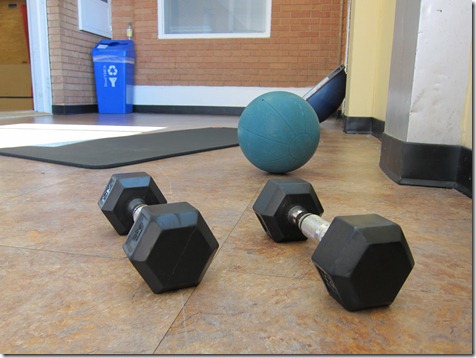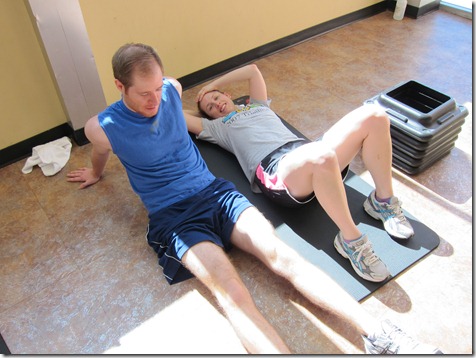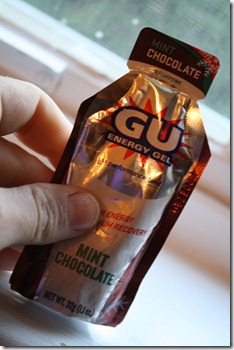Day 2 of Boot Camp, done!
Today’s Boot Camp actually seemed a lot easier than Day 1 because I knew the moves and what modifications I needed to do. My muscles feel stronger already! 🙂
The Husband did Boot Camp with Nicole and I. He regularly strength trains and said it was challenging, but not impossible.
Nicole + Husband also had fun comparing legs to see who’s was the whitest (the Husband won).
Lunch:
A big pumpernickel and hummus sandwich:
Roasted ‘fries’:
Reader Question: Crying Uncle During Marathon Training
Annie wrote, “I’m writing about something I’ve been struggling with for a few weeks – the emotional side of marathon training. I’m currently in week 11 of an 18-week training plan to run my first marathon on May 1. The first few weeks were relatively unremarkable and they flew by. Then I came down with a nasty cold and had to skip a few runs. I’m back into the swing of things now, but have been struggling emotionally since. On top of training, I’m currently in my 3rd year of a Clinical Psychology PhD program, and this semester is the most challenging to date. I’m totally burnt out from school, and I feel increasingly defeated with every long run that I do. Running is usually a source of joy in my life, but recently it’s been just the opposite.
I did 15 miles last weekend (my PDR), and instead of feeling excited about conquering a new distance, I felt angry with myself for voluntarily doing something that left me exhausted/in pain. My friends and family keep telling me that it’s OK to not run the marathon, especially given how many other things are on my plate. They say I need to give myself permission to NOT run the full marathon. I understand what they’re saying, and agree. I’m a therapist-in-training and would tell my therapy clients the same thing. But I can’t help but wonder if this burnout is part of the deal. Part of me wants to drop down to the half marathon, but the other part of me is saying just to suffer through it for 7 more weeks.
I worry that if I quit training, I’d regret it but it would be too late to resume training. There are also fears/doubts about NOT being able to complete the distance on race day (15 miles HURT and I can’t fathom doing 11.2 more), or injuring myself in the weeks leading up to it.
Marathon training is the hardest thing I’ve ever done. I heard people say that before beginning but there’s no way to truly understand that until you experience it firsthand. Did you experience similar burnout/anxiety when training for your marathons? At what point is this burnout no longer normal? And how the heck do you motivate yourself every.freaking.weekend for a long run?â€
What a great – and important – questions! I thought I’d share my experiences and feedback, and then I’d love to also hear YOUR advice for Annie. Some background: I ran the Disney Marathon in January 2010, and I ran Spinx Run Fest Marathon in October 2010. I finished Disney in 4:53, and I finished Spinx in 4:22 (I was insanely happy with my second marathon).

Marathon training is an awesome, crazy beast. And truly, as Annie is discovering, it’s as much about your mind as your body. It’s a grueling and looong journey, and the only really exciting glory is at the end!
I intended to run my third marathon in December, but I ended up dropping out. Why? I knew I didn’t have the time or energy to run it. So instead, I ran the 5K (and had a blast). But how could I tell the difference between the natural burnout I felt during marathon 1 and 2 and the sinking feeling that marathon 3 would wipe me out? Some thoughts:
- Long runs are significantly better when you are doing them with a partner. If you don’t have any friends or coworkers to run with (and remember, you can cajole someone who is running shorter distances to do a segment of the long run with you – it doesn’t have to be the whole thing), ask them to be your buddy. If you don’t know anyone who runs, look into joining a local running club and doing your long runs with a group. There are all sorts of people in running clubs, and I guarantee you can find someone who runs your distance and pace.

- Keep your eye on the prize. Marathon training is so long and arduous that it seems like the journey will never end. I found it helpful to read other people’s race recaps or watch inspiring movies like Spirit of the Marathon (which you can watch for free on Hulu!).
- Join an online running community like Daily Mile. DM has a great forum where runners can talk and motivate each other. It won’t help with the mid-run blues, but it’s a great way to stay focused and connected.

- Remember that a training plan builds in room for laziness, illness, or boredom. You don’t have to follow a training plan 100% – I aim for 90%, which means I completely miss a run (and don’t reschedule) 1 out of every 10 times. The most important thing is to try to get most of your long runs in, but if you miss a few, it’s OK! It’s more than OK to miss runs if you’re feeling ill or really rundown and sore. That’s your body’s way of telling you the plan isn’t perfect for your bod, so take a few days off.
- Make sure you’re fueling properly. Mid-run sluggishness is usually due to lack of fuel. If you feel super sluggish, check out my tips for indentifying the cause. Over 9.0 miles, I start taking in calories via Gu or Gatorade. How many calories you need depends on your unique needs, including your gender, weight, and how much you ate the day before and right before your run. Experiment with taking in calories during your long runs so you don’t ‘hit the wall’ during the marathon. Here’s more info on fueling for long runs.
- There is absolutely nothing wrong with the walk/run method for ALL of your runs. If you’re really not feeling up to a hard run, walk/run it. I actually set my Half Marathon PR by the walk/run method – it usually makes you faster overall than if you slowly jogged the entire thing. Plus, it’s a real boost to your morale when you get to take a walking break – as long as you remind yourself that walking is NOT failing.

- On some level, burnout is part of the deal. This is the big difference between Half and Full marathon training. Mental burnout happens to every single marathon runner at some point. Sometimes it lasts for a day, sometimes it’s longer. Taking a week off of your training plan and just sticking to shorter runs or doing another form of exercise (like swimming) might help chase the blues away. Burnout is a natural reaction; however, it can be compounded by other factors…
- …Not every moment is the right moment to run a marathon. When I decided to do both of my marathons, I carefully looked at my work schedule and really thought about whether I had the time for training. When I dropped out of my third, I dropped down because I knew I couldn’t handle the emotional and physical pressures of work + training without being a miserable, angry beast. At the peak of marathon training, you’ll be running a total of at least 5.0 hours a week, which might not sound like a lot… but you also have to build in extra sleeping time (trust me, you’ll need it) and time for cross training/stretching.
My ultimate advice to someone like Annie? If Annie is overloaded at school, and the mental and physical stress of her studies + marathon training might just be too much. Dropping down to the half marathon is like the ace in your pocket. Taking a week off of marathon training won’t ruin your training at all – even taking two weeks, if you still run 10 – 15 total miles or so each week, won’t have disastrous results. Just pick up on your long runs where you left off (i.e. don’t skip ahead two weeks because the increase will be too much). If you did a 15 miler and then skipped a 16 and 17 miler, don’t do the 18 miler next – do 16 or 17, depending on how you feel. You can either eliminate a ‘drop down’ week in your training schedule or just max out at whatever distance you end up maxing out at – some marathon training plans only have you maxing out at 16 or 18 miles. Worst case scenario, you can fall back on the walk/run method on race day.
However, if you take off two weeks and you really DO NOT want to start up with training again, just maintain your current level of fitness and enjoy the Half. You can always run another marathon – you might even be able to find a marathon that’s 2 months after the Half and just ride out the training. If it’s not fun, it’s not worth it.
Want more marathon and running advice? Check out:
- Prepping for Your Long Run
- How to Handle 5 Running Gross-Outs: Blisters, Chafing, Pooping, and More
- How I Create Training Plans
- Coping with “Bad Runs†During Training for a Race
- So You Want to Run a Half Marathon
- How to Not Hate Your Long Workouts
- How I Recover Quickly
Did you experience burnout when training for your marathon? Did you drop down or power through? What advice do you have for Amy?








Oh lordy, the thought of boot camp training makes my legs all jiggly. Sounds terrifying!